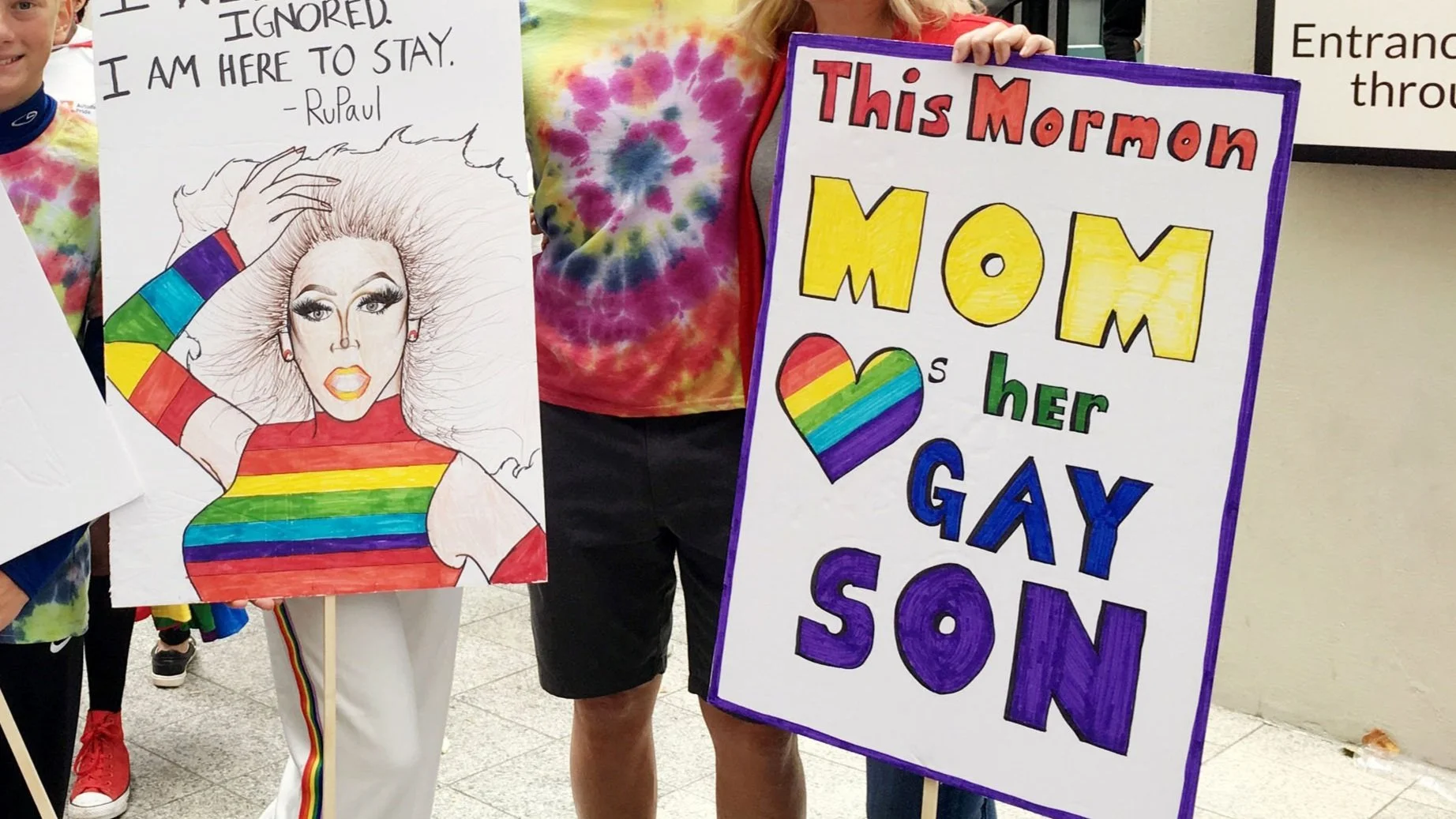Allies’ unbridled compassion is harming Gay Latter-day Saints.
Warning: Sensitive sexual content is mentioned briefly in this article.
Bridling our Compassion is How We Truly Love
When we see our children or friends hurting, don’t we have compassion on them and strive to do whatever we can to support them and heal their pain? Etymologically, to be compassionate for someone is literally “to suffer with them.” Compassion is shown by “mourn[ing] with those that mourn; yea, and comfort[ing] those that stand in need of comfort;” but, we are also implored to “see that [we] bridle all [our] passions, that [we] may be filled with love” (Alma 38:12); this includes bridling our com-passion for others.
When a family member or friend comes out as “gay,” or experiencing SSA (same-sex attraction), I’ve often seen one of two reactions, depending on the culture and family. Many of us have heard the heart-wrenching stories of particular individuals who, in a moment of vulnerability, came out to their families about their struggles with SSA, hoping to get some help and support from them, only to be crushed when their parents kick them out of the house and/or disown them, without even trying to understand their child’s concerns or perspective. As tragic, heartbreaking, and terribly un-Christlike of a response as this is, I think that this type of response is becoming more rare in Western Society—thank God. But, just as equally un-Christlike, on the opposite extreme of the spectrum, is the response from parents, siblings, or friends, who, out of a sincere and well-intentioned desire to support and uplift these hands that hang down, overcompensate to advocating for and even encouraging every decision that the “outed” individual makes, even if those decisions lead down a path that is not in harmony with the gospel and God’s will for them. Some parents may say, “As long as you’re happy, that’s all I care about, and I support you in your decisions.”
(If you’re an ally, or want to be an ally, and are uncertain of what the scriptures actually teach about homosexuality, this a highly informative article: ἀρσενοκοῖται–Paul’s meaning is crystal clear. If you want to know if the doctrine will change on this matter, check out the Church website here.)
My little girl has an insatiable sweet tooth—but maybe that’s all children. I think she would survive solely off of sweets, if we let her. But, there are obvious negative health consequences to this; she could get diabetes or tooth rot. So, as good parents, my wife and I try to limit her sugar consumption. In response to us restricting her sugar intake, our daughter will often throw tantrums, crying, yelling, and telling us “I’m not your friend anymore” or “You’re making me sad.” I hate seeing her in that emotional distress, and sometimes, because I fear losing my good rapport with her, and not wanting to see her feeling this emotional pain, I relent and give her the candy she’s desperately yearning for. But, if I allow my compassion for her to drive me to continue enabling her to indulge her appetite for sweets, it’s only going to contribute to her eventually developing health issues and her developing a sense of entitlement for anything she wants.
Now, obviously this is a very mild example, but the same principle can be applied when we have children and friends who “come out” as gay. The hurt, pain, and confusion they may be feeling as they navigate their faith and sexuality is real and poignant. I know from firsthand experience how crucial it is to have love and support from loved ones, when going through this journey. Surely, we need to “be at the forefront in terms of expressing love, compassion, and outreach to those” (Quintin L Cook) who are struggling; but, unbridled compassion is harmful. Elder D Todd Christofferson taught on this matter that, “Compassion for our neighbor’s distress, for example, even when the suffering is brought about by his or her own transgression, is noble and good. But an unbridled compassion could lead us … to question God’s justice and misunderstand His mercy.” Unbridled compassion leads us to doubt God’s commandments or even advocate the breaking of them. This is not showing love, for “[love] does not rejoice at wrongdoing, but rejoices with the truth” (1 Corinthians 13:6 ESV).
Physical and Spiritual Harm from Living a Gay Lifestyle
Just like with the analogy of my daughter and sweets, there are real, and sometimes serious physical health ramifications for pursuing a gay lifestyle, that many people may not consider. LGBT individuals are 28 times more likely to contract HIV and other STDs than heterosexual couples, according to the U.N.. (I remember always being scared that I would contract HIV when I was sleeping around with my boyfriends, and would regularly go to get tested.) You might think, “Well, this won’t happen to my son or daughter, as long as they’re monogamous and practice safe sex,” but STDs aren’t the only health concern. I’m sorry if this is TMI, but, people need to know the truth: I can tell you from personal experience, that engaging in anal sex has been proven to damage one’s anus and rectum and can lead to incontinence (see NIH; Anal Intercourse and Fecal Incontinence). It took me years to heal from this after I left my gay lifestyle behind. (The likelihood of physical harm is even more apparent for our kids with gender dysphoria who are put on irreversible puberty blockers or who want to cut off healthy body parts to reduce their dysphoria.) Even with these physical health issues that can arise, in my opinion, what’s more harmful is the inevitable damage to our spiritual health.
I think most of us know the doctrine concerning chastity; but, for clarity, sexual relations are only to be had between a husband and wife, who are lawfully wedded. Any sexual acts committed outside of the bonds of marriage, whether heterosexual or homosexual, are equally grievous to God, and are sinful. In comparison to the physical damage that can come from living a gay lifestyle, sexual sin is “most abominable above all sins save it be the shedding of innocent blood or denying the Holy Ghost” (Alma 39:5). Paul also teaches that, “Do you not know that he who unites himself with [someone outside marriage] is one with her [or him] in body? For it is said, ‘The two will become one flesh.’ But whoever is united with the Lord is one with him in spirit. Flee from sexual immorality. All other sins a person commits are outside the body, but whoever sins sexually, sins against their own body” (1 Corinthians 6:16–18, NIV; emphasis added). I saw this myself in my many sexual encounters, that the carnal pleasure and excitement—some might say “happiness”—was there, but the spiritual connection and fulfilment, that could and should be present during sex, was totally absent. This wasn’t something that I realised until after I married my wife and started experiencing the true sacrament of the sexual union, as God ordained it to be. So, when we commit sexual sin, unlike being united with the Lord in spirit, we cut ourselves off from him, and sin against our own body, becoming spiritually dead. Although we cannot necessarily see the effects of spiritual sickness and death, this is a worse condition, in my opinion. Often, lifestyles or actions that harm the flesh and spirit go in tandem—one affects or influences the other—but harm to the body is temporary, whereas the consequences of spiritual sickness and the resulting death are eternal. There is nothing loving about enabling our friends and family to continue down a path that will lead to spiritual death; separation from our Heavenly Father.
Compassion is not Condoning or Enabling
When I was younger, I became wrapped up in substance abuse and a reckless partying lifestyle, because that is what made me “happiest” at the time. Out of a deep concern for my welfare, my parents got me arrested, starting me down a gradual path of rehabilitation and recovery. Rather than turn a blind eye to or enabling my destructive lifestyle, they did the most loving thing they could have done for me: they got me sent to jail. I absolutely hated and resented them for years for doing that to me, and for the subsequent felony that resulted; but now, I am deeply grateful to them for loving me enough to tell me that I was wrong and helping me to correct my behaviour.
Obviously, this is a severe example, so let’s look at how the Saviour handled an extremely controversial event in his day: When Jesus was left alone with the woman taken in adultery, “Jesus stood up and said to her, ‘Woman, where are they? Has no one condemned you?’ She said, ‘No one, Lord.’ And Jesus said, ‘Neither do I condemn you; go, and from now on sin no more’” (John 8:10-11 ESV; emphasis added). Notice how he handled the situation? He didn’t say, “Because I love you and have compassion for you, and if your fornication makes you happy, then I will support you in that, and I’m going to find some justification to make your actions right.” No, because of his compassion for her, he said that he did not condemn her, and as another manifestation of that compassion, asked her to not sin anymore. Please understand: I am not saying that merely experiencing SSA is a sin—it clearly is not—but when our family and friends experiencing SSA decide to start dating the same gender and pursue such a lifestyle, how will we respond? I hope, like the Saviour; with deep compassion, undeviating from the truth.
Conclusion
What does this actually look like? Like with my daughter, there is nothing compassionate about allowing her to eat copious amounts of sweets. I show the most love for her by helping her to keep her desires, appetites and passions within the bounds the Lord has set. I also need to make sure that she knows, that if she ever sneaks a cookie or even decides to binge on ice cream every night when she’s an adult and living independently, even though I may be disappointed in her actions, I will still love her and will always be there for her—no matter what. And if she ever ruins her life by becoming obese and developing diabetes, I will be there every step of the way to help her get fit and healthy.
Although my parents definitely were not perfect in everything they did, I feel like they did an amazing job in showing their love and compassion in a Christlike way, without enabling my sin. While I was still living an open gay lifestyle and dating men, my parents never once excluded me from their activities or family events. I always knew that I was welcome over any time. They told me where they stood on certain doctrinal issues, but they made sure that I knew that their love for me was not contingent upon me following those beliefs. Although I vehemently disagreed with their faith at the time, I respected them, and knew they loved me regardless of my actions. I’m deeply grateful for their approach.
Dear Allies: Please, bridle your compassion, and show us the Christlike love that “does not rejoice at wrongdoing, but rejoices with the truth.” Please, love us enough to pull us out of the tumultuous waters the doctrines of men mingled with scripture, to place us safely in the security of the boat of the everlasting gospel of Jesus Christ.




